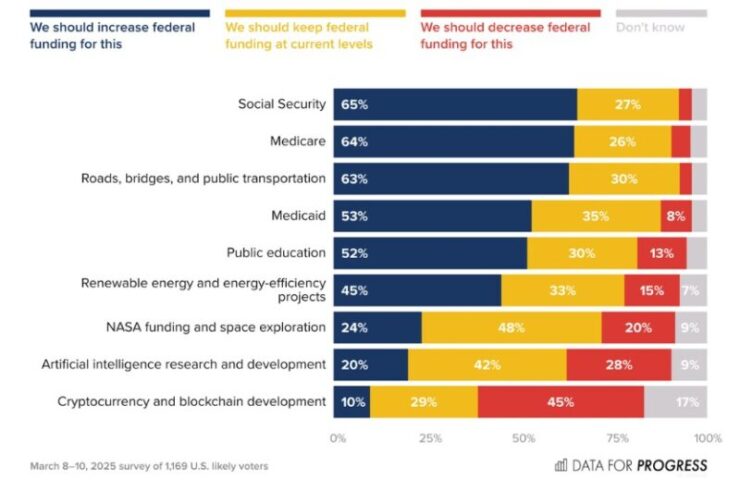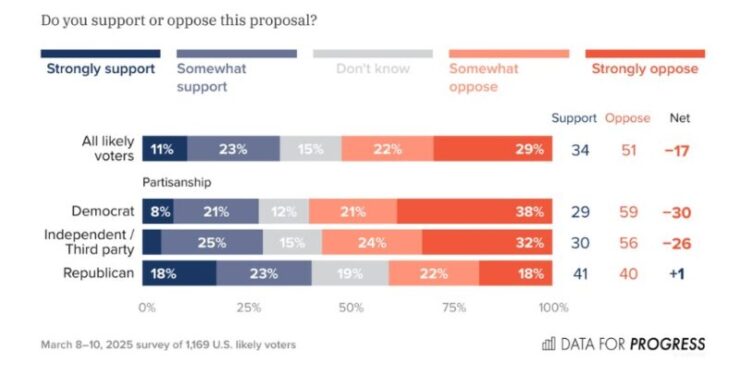Recent polling data reveals that a significant majority of American voters are against increasing federal funding for cryptocurrency and blockchain development. This sentiment emerges amidst the U.S. government’s initiatives to integrate digital assets into national financial strategies.
According to a survey conducted by Data for Progress between March 8 and 10, 2025, only 10% of respondents support boosting federal investment in cryptocurrency and blockchain sectors. The poll, which included 1,169 likely U.S. voters, highlighted that cryptocurrency and blockchain development ranked lowest among nine potential federal funding priorities, trailing areas such as Medicare, Social Security, public infrastructure, and artificial intelligence.

Opposition to the Proposed Crypto Strategic Reserve
The survey also addressed President Donald Trump’s proposal to establish a national strategic crypto reserve, encompassing cryptocurrencies like Bitcoin (BTC), Ethereum (ETH), Solana (SOL), Cardano (ADA), and Ripple (XRP). The findings indicate that 51% of voters oppose the creation of such a reserve, with 40% of Republican respondents and 59% of Democrats expressing disapproval.

One contributing factor to the backlash appears to be the wording of the survey itself. Voters were informed that the proposed reserve would involve “government spending”—a sensitive issue for many Americans amid ongoing debates over fiscal responsibility. However, it’s worth noting that Trump’s executive order authorizing the crypto reserve outlines “budget-neutral strategies” for acquiring digital assets, specifically emphasizing no incremental cost to taxpayers. This distinction suggests that the government intends to source crypto assets primarily from confiscations and legal proceedings, not taxpayer-funded purchases.
Adding to the skepticism, the poll also asked respondents whether they favored increasing or decreasing federal funding for various technological and financial priorities. Crypto and blockchain development ranked lowest among nine categories, with 45% of voters supporting cuts to federal funding in the sector. This placed crypto well below other emerging industries like artificial intelligence and space exploration, which garnered broader support.
Younger Voters Show More Support for Crypto Funding
The poll also indicates that, although there’s some backing for cryptocurrency initiatives, much of the electorate is either undecided or hesitant to support increased government involvement.
Notably, voters under the age of 45 appear to be the most receptive to boosting federal funding for cryptocurrency and blockchain development. According to the survey, 18% of respondents in this age group support increasing funding, reflecting younger generations’ familiarity with digital assets and emerging technologies. In contrast, among those over 45 years old, only 6% expressed support for additional government investment in crypto—a clear indication of generational divides in attitudes toward digital finance.
Interestingly, despite Trump’s proposal of a strategic crypto reserve, even within his own party, enthusiasm for government spending on crypto initiatives is muted. 36% of Republican respondents stated they preferred a decrease in federal funding for crypto development, while only 12% supported an increase. Meanwhile, 31% of Republicans favored maintaining current levels of funding, and 20% admitted uncertainty, indicating the issue hasn’t gained widespread traction even among the party’s base.
Overall, cryptocurrency and blockchain remain relatively low on voters’ lists of federal priorities. A large portion of respondents—across political affiliations—reported being unsure about whether to increase or decrease funding, highlighting a general lack of clear public consensus or understanding about the sector’s role in national economic policy.
Quick Facts:
- 51% of American voters oppose the creation of a national strategic crypto reserve, with notable disapproval among both Republican (40%) and Democratic (59%) respondents.
- 18% of voters under 45 support increasing federal funding for cryptocurrency development, compared to just 6% support among voters over 45.
- 36% of Republican respondents favor decreasing crypto funding, while only 12% support increasing it.
- 31% of Republicans prefer keeping crypto funding at current levels, with 20% unsure about future funding decisions.





